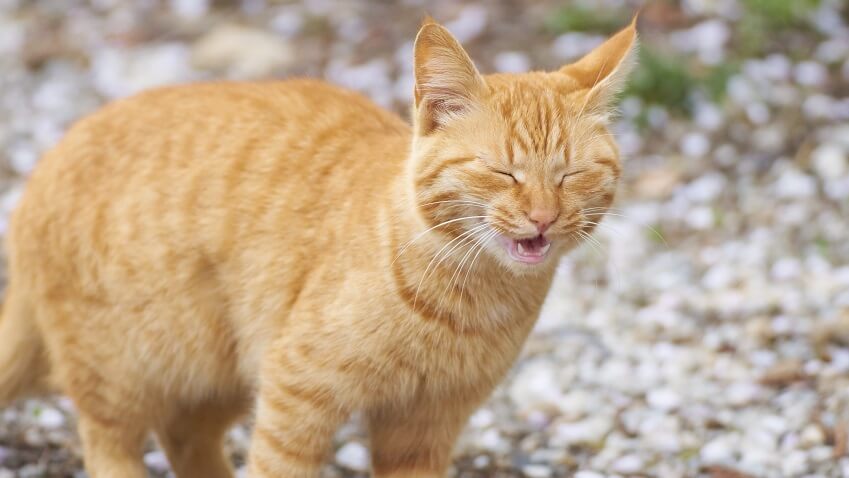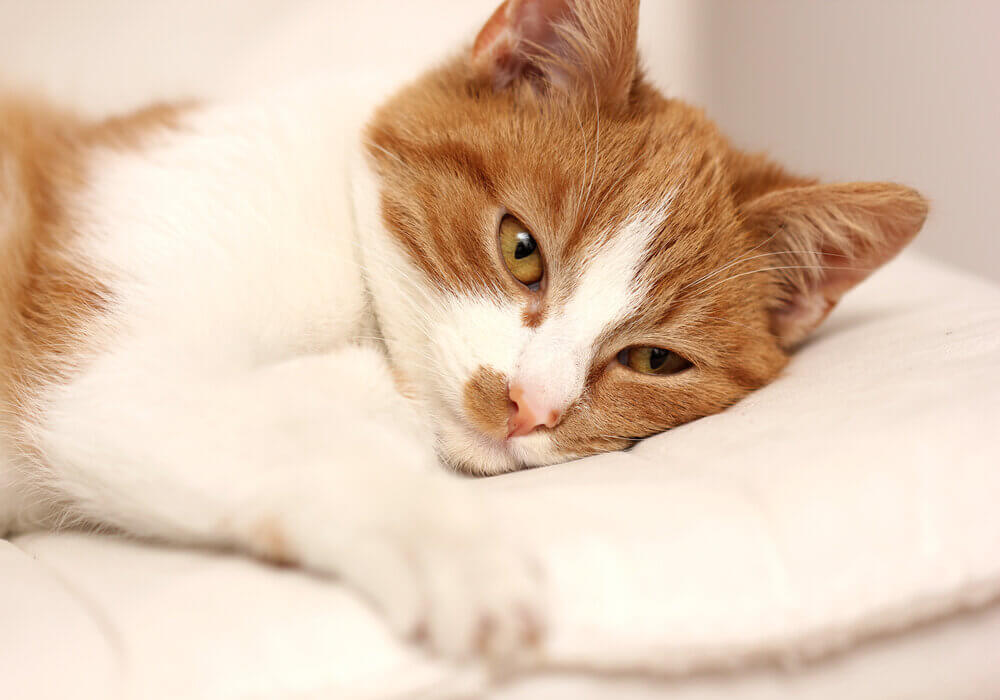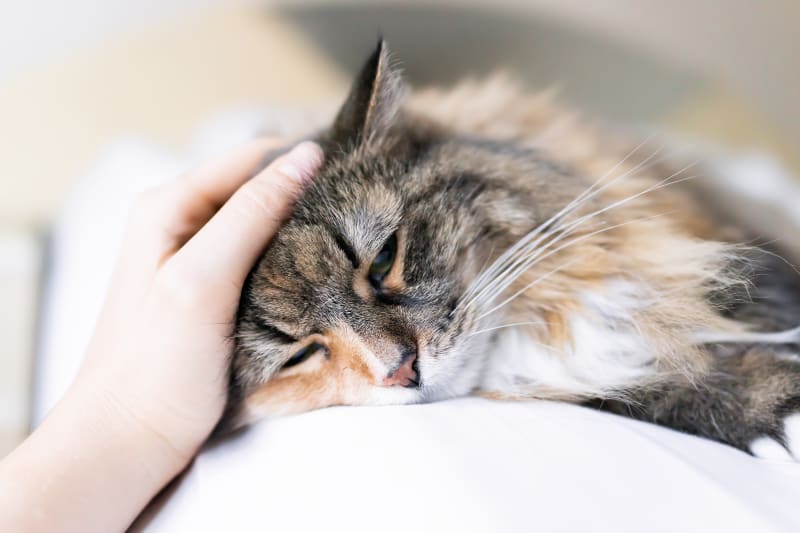What's the Deal With My Cat's Sneezing?
While cat sneezes are one of the most endearing sounds you'll ever hear, they can also be alarming in some situations. You're not alone if you're wondering why your cat sneezes so much.
Then pay great attention to your feline to see if other signs or symptoms emerge. Sneezing occurs in cats for the same reasons in humans: the cat's body, particularly the nose, reacts to irritants that enter the nasal passages. Additionally, cats can sneeze as a result of movement or excitement.
Suppose your cat sneezes more frequently, more intensely, or develops other symptoms. In that case, a trip to the veterinarian is essential to determine why the cat is sneezing and whether therapy is necessary.
What's the Deal with My Cat's Sneezing?
Cats sneeze for various reasons; some are harmless, while others can be hazardous. If your cat is sneezing excessively, your veterinarian will examine the cat's symptoms and try to form a diagnosis. Cats sneeze for a variety of reasons, including:
- They detect a scent, such as perfume or chemicals.
- Dust or other airborne particles may be inhaled.
- Grass, hair, lint, or any other foreign object
- Infection of the upper respiratory tract
- Inflammation of the nasal cavity or sinuses
- A dental infection or inflammation that drains into the sinuses.
When Should You Take Your Cat to the Vet If He's Sneezing?

Whether your adult cat sneezes on occasion and has no other symptoms, you may be able to wait a day or two to observe if the sneezing gets worse or if other symptoms arise. For kittens, however, this is not the case. If your kitten is sneezing and has different symptoms, you should take them to the veterinarian.
If the sneezing persists after a few days to a week, and other severe symptoms appear, a trip to the vet for diagnosis and treatment is essential. If your cat has stopped eating, this is crucial.
Because upper respiratory infections impair people's ability to smell and taste their meals, lack of appetite is common. Eating is unpleasant due to this and causes problems breathing through the nose. Swallowing may sometimes be difficult due to specific disorders.
Humans, dogs, and other animals may survive weeks or even months without eating, but cats can starve if they don't eat for only two or three days. Fatty liver disease (hepatic lipidosis) is a dangerous and sometimes fatal ailment that cats get when this happens.
Infections of the Upper Respiratory Tract in Cats

One of the most common causes of cat sneezing is upper respiratory illnesses. It could be something as minor as a cold or severe, like a viral, a bacterial, or fungal infection. Depending on the symptoms or nose, your veterinarian may swab your cat's eyes, mouth, and throat, and send it to a lab to narrow down or confirm the diagnosis.
Feline Herpes Virus.
The Feline Herpes Virus is a virus that cats can contract from other cats. Stress frequently triggers a flare-up, making it more contagious to other cats. It is inactive in the cat's system otherwise. The goal of treatment is to keep the symptoms under control during flare-ups. Humans are not infected with feline herpes.
Feline calicivirus
Feline calicivirus is a highly contagious virus that causes mouth ulcers in cats. It can also harm the cat's respiratory system, resulting in pneumonia.
These diseases can make your cat more prone to other respiratory problems, exacerbating sneezing. A cat with herpes, for example, may acquire bacterial infection. Antibiotics can be used to treat these infections.
Upper Respiratory Infection
Sneezing and trouble breathing are two symptoms of an upper respiratory infection in cats:
- Sneezing for several hours or days
- Eye or nose discharge that is clear, yellowish, greenish, or crimson
- Repeated swallowing or coughing
- Fever, drooling, weariness, depression, or lethargy are all fever symptoms.
- Dehydration is indicated by a lack of hunger, a decrease in appetite, weight loss, or dehydration.
- Coat in poor condition
Upper urinary Tract Infection

An upper urinary tract infection is more likely to develop in kittens and elderly cats. Because the viruses that cause these infections are usually very contagious, cats housed in groups, such as multi-cat households or overcrowded shelters, are particularly vulnerable to infection, particularly if they have not been vaccinated.
Variety of Infections
Although the ailments listed above are the most prevalent, your cat can sneeze due to a variety of infections, including:
- Infectious peritonitis in cats
- Feline Immunodeficiency Virus (FIV) is a virus that affects cats (FIV)
- Feline leukemia is an illness that affects cats.
- Chlamydia
- Bordetella
- Mycoplasma
- Nasal and Sinus Problems
Sinusitis and Rhinitis
Sinusitis and rhinitis, inflammatory disorders affecting the nose, can afflict cats. Inflammation of the tissue lining the sinuses causes sinusitis, while inflammation of the mucous membranes of the nose causes rhinitis, also known as a stuffy nose. When these two disorders co-occur in cats, the condition is known as rhinosinusitis. They are frequent side effects of upper respiratory infections.
Frequent sneezing is a symptom of sinusitis and rhinitis, as are the following:
- In mild cases, there will be a clear discharge from the nose.
- Severe cases: nasal discharge that is yellowish, greenish, or bloody.
- Face pawing or fretting
- Tears and discharge from the eyes
- Reverse sneezing is when you try to clear your nostrils with short, quick inhalations.
- A little lump on the bridge of the nose if it's fungal
A comprehensive physical exam and a study of your cat's medical history are required to diagnose sinusitis and rhinitis. A rhinoscopy, in which a small endoscope is used to examine the nasal anatomy and a nasal wash is performed to get a sample, may be performed by the veterinarian.
Cats with Chronic Upper Respiratory Infections
Upper respiratory infections in cats, like in humans, can progress to chronic upper respiratory illnesses. Chronic rhinitis can affect cats who with frequent and recurring sneezing "spells."
Chronic upper respiratory diseases in cats have symptoms similar to those described above but may continue much longer, often weeks or months at a time. They can also cause recurrent bacterial infections, which can exacerbate the symptoms.
Chronic upper respiratory infections can cause the following symptoms:
- Sneezing fits that last a long time.
- a stuffy, runny nose
- The nasal discharge is thick and yellow.
- No desire to eat
- Drooling and difficulty swallowing.
- The eyes are discharged.
Cats that have recovered from viral diseases such as feline herpes and feline calicivirus are more likely to develop chronic upper respiratory issues. In this case, their symptoms may last for a short or long time. They're also more likely to get virus flare-ups due to illness, stress, or immunosuppression.
Chronic illness

If your veterinarian suspects that your cat is suffering from a chronic illness, they may conduct one or more of the following tests to discover the underlying causes:
- Tests of the urine and blood for viruses and other infectious disorders
- X-rays, CT scans, or magnetic resonance imaging (MRI) of the throat, nose, and chest
- Rhinoscopy is a procedure that allows you to have a better look at the structures inside your cat's nose.
- Biopsies of the nose to see if any organisms are present
These persistent upper respiratory disorders have no known treatments. Typically, veterinarian care and drugs are used to manage the symptoms.
Inhaled Irritants and Allergies
Cat allergies rarely induce sneezing, but they can cause skin irritation, itching, and hair loss. Some cats with allergies, especially asthma, may experience watery, itchy eyes, coughing, wheezing, and sneezing. This is known as allergic rhinitis, and it is seasonal if outdoor allergens cause it. They may have year-round symptoms if indoor allergies cause them.
The following are examples of potential allergies and irritants:
- Perfume
- Bug repellent
- Tobacco smoke
- scented litter or dust-producing litter
- Candles
- Agents of cleaning
- Pollen
- Dust
- Mold
- Sneezing Cats and Vaccines
Vaccines
Vaccines, particularly those intended to prevent upper respiratory infections, can cause cats to sneeze. In these cases, the symptoms usually go away on their own after a few days.
Is Cat Sneezing a Serious Condition?
There's usually no need to worry if your cat sneezes now and then; we all do it and often don't know why. If your cat experiences this, it is most likely due to one of the minor concerns listed above. Their nasal passages have been inflamed by whatever they inhaled. If you find your cat sneezing frequently, keep track of when it happens.
Make a note of when your cat sneezes at the same time every day, during a specific activity, or in a particular room to help your veterinarian diagnose the problem. This can assist you and your veterinarian in determining the cause of your cat's sneeze.
It's usually a good idea to start with the simplest and most obvious option. When you clean or use their litterbox, does your cat sneeze? If you answered yes, it's possible that the chemicals in cleaning products or litter are to blame. Cats are susceptible to odors and picky smells. Changing your cat's cleaning products or litter could be the answer to his sneezing.
If your cat is frequently sneezing and you've seen other signs such as discharge from the eyes or nose and a decrease in appetite and energy, it could be a sign of something more serious. Your cat could have an upper respiratory infection or some underlying problem that necessitates a visit to the veterinarian.
What Should You Do If Your Cat Is Sneezing?

It's time to call the vet if you observe your cat sneezing frequently or if you notice any of the symptoms listed above. These are symptoms of a sickness or condition that will be difficult to treat without veterinary assistance.
Treatment Options
If you suspect your cat has an upper respiratory infection, there are a few things you can do right away to help him feel better, including:
- Using a warm, wet cotton ball, clean any discharge from your cat's eyes, nose, and face.
- Tempt them to eat by providing them with their favorite goodies or warming up canned food.
- Ensure that your cat gets enough fresh water.
- To keep your cat's nasal passage moist, use a humidifier.
Severe Treatment Options
In moderate situations, this may be sufficient to allow the infections to resolve on their own within a few days or a week. Additional therapies, such as the following, may be required in more severe cases:
- Antibiotics and antiviral drugs
- Drops for the nose or eyes, or both
- Steroids are used to treat inflammation.
- Dehydration can be treated with subcutaneous fluids.
Severe upper respiratory infections may need your pet's admission to the hospital for treatments such as IV fluids and nutritional support. If your cat has been exhibiting symptoms for more than a week, you should schedule an appointment with a veterinarian as soon as possible. An upper respiratory infection, if left untreated, can lead to significant complications such as pneumonia, long-term or chronic breathing problems, and, in some cases, blindness.
If your cat has sinusitis or rhinitis, your veterinarian may prescribe a nasal flush along with broad-spectrum antibiotics to treat or prevent bacterial infection. He may also administer steroids to your pet to clear the sinuses and nasal passages. It's possible that IV fluids and nutritional support will be required.
There is no cure for allergies in cats, just as there is no cure for allergies in humans. In this case, your veterinarian will create a strategy to relieve your cat's problems. Depending on the origin of the allergy, this will most likely include allergy medications for cats and a special diet (food or inhalant). Apoquel is a popular allergy medication for cats and dogs.
Sneezing can indicate a problem with your cat's immune system. Providing complete and well-balanced food to a cat is one of the best treatments for cat sneezing to increase their natural defenses and help them battle sickness effectively.


.jpg)



